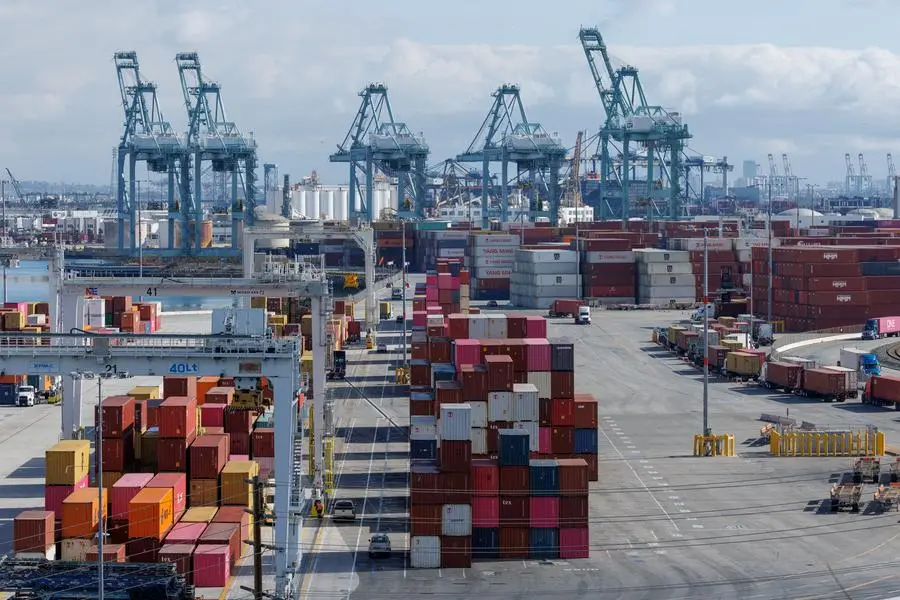PHOTO
China refused to bow to what it called "blackmail" from the United States as a global trade war ignited by President Donald Trump's sweeping tariffs showed few signs of abating on Tuesday, even as battered stock markets steadied.
Beijing's rebuke came after Trump threatened to ratchet up tariffs on U.S. imports from the world's No. 2 economy to more than 100% on Wednesday in response to China's decision to match the "reciprocal" duties Trump announced last week.
China's fast and hardline approach contrasted with more emollient moves by other Asian countries. The European Union is also still consulting with member states on how hard to punch back against Trump's tariffs without causing more harm to its consumers and exporters.
"The U.S. side's threat to escalate tariffs against China is a mistake on top of a mistake, once again exposing the American side's blackmailing nature," China's commerce ministry said.
"If the U.S. insists on having its way, China will fight to the end."
European Commission President Ursula von der Leyen in a phone call with China's Premier Li Qiang called on Beijing to ensure a negotiated solution and stressed the need to support a fair trading system founded on a level playing field.
The two also discussed setting up a mechanism to track possible trade diversion caused by the tariffs, von der Leyen's office said, as the EU fears China will redirect cheap exports from the U.S. to Europe.
Chinese manufacturers of goods from tableware to flooring are warning about profits, and scrambling to plan new overseas plants as they reel from the tariff news. Citing rising external risks, Citi cut its 2025 China GDP growth forecast to 4.2% from 4.7%.
The European Union has proposed counter-tariffs of its own to Trump's onslaught that has swept up dozens of countries, sent financial markets into a tailspin and fuelled expectations that the global economy may be headed for recession.
'UNRECOGNISABLE' US
As financial markets remained volatile, the head of the pan-European stock exchange operator Euronext said the United States was starting to resemble an emerging market.
"Fear exists all over," Stephane Boujnah told France Inter radio, saying the U.S. had become "unrecognisable".
"There is a certain form of mourning, because the United States that we had known for the most part as a dominant nation resembled the values and institutions of Europe and now resembles more an emerging market."
Emerging markets often use targeted tariffs to protect certain industries from foreign competition.
Stock markets found a firmer footing on Tuesday after a gut-wrenching few days for investors which prompted some business leaders, including those close to Trump, to urge the president to reverse course.
European shares bounced off 14-month lows in early trading after four straight sessions of heavy selling, while global oil prices rebounded following a hefty sell-off.
U.S. stock index futures edged higher after taking in trillions of dollars in losses since last week, as investors keenly await any sign of the U.S. opening up for negotiations.
Japan's Nikkei index closed 6% higher on Tuesday while Chinese blue chips climbed 1%, clawing back some of the more than 7% slide on Monday.
Indonesian markets were slammed, however, with stocks shedding 9% as trading resumed after an extended holiday. Its central bank pledged to intervene, joining efforts by other global authorities to stem the rout in recent days.
Trump said the tariffs - a minimum of 10% for all U.S. imports, with targeted rates of up to 50% - would help the United States recapture an industrial base he says has withered over decades of trade liberalisation.
EUROPE EYES COUNTER-MEASURES
The European Commission, meanwhile, proposed counter-tariffs of 25% on a range of U.S. goods including soybeans, nuts and sausages, though other potential items like bourbon whiskey were left off the list, a document seen by Reuters showed.
Officials said they stood ready to negotiate a "zero for zero" deal with Trump's administration.
The 27-member bloc is struggling with tariffs on autos and metals already in place, and faces a 20% tariff on other products on Wednesday. Trump has also threatened to slap tariffs on EU alcoholic drinks.
Facing some of the steepest U.S. duties, low-cost manufacturing hub Vietnam has requested a 45-day delay and said it will buy more American goods to rebalance trade.
With its rupiah currency plunging to a record low, Indonesia announced concessions for U.S. imports including reducing taxes on electronic goods and steel in an attempt to win over the White House.
South East Asia's biggest economy will also send a delegation to Washington next week seeking a deal to ease the impact of a 32% tariff due to take effect on Wednesday.
South Korea is considering measures to increase imports from the U.S. as it prepares its own talks with Washington.
U.S. Treasury Secretary Scott Bessent met with Trump in Florida on Sunday, Politico reported, to urge him to emphasize striking trade deals to reassure markets there is an endgame to his strategy.
Elon Musk, head of Trump's effort to slash government spending, has called for zero tariffs between the U.S. and Europe, and the Washington Post reported that he has appealed directly to Trump to reverse the tariffs.
(Reporting by Reuters newsrooms; Writing by John Geddie and Matthias Williams; Editing by Lincoln Feast and Hugh Lawson)





















